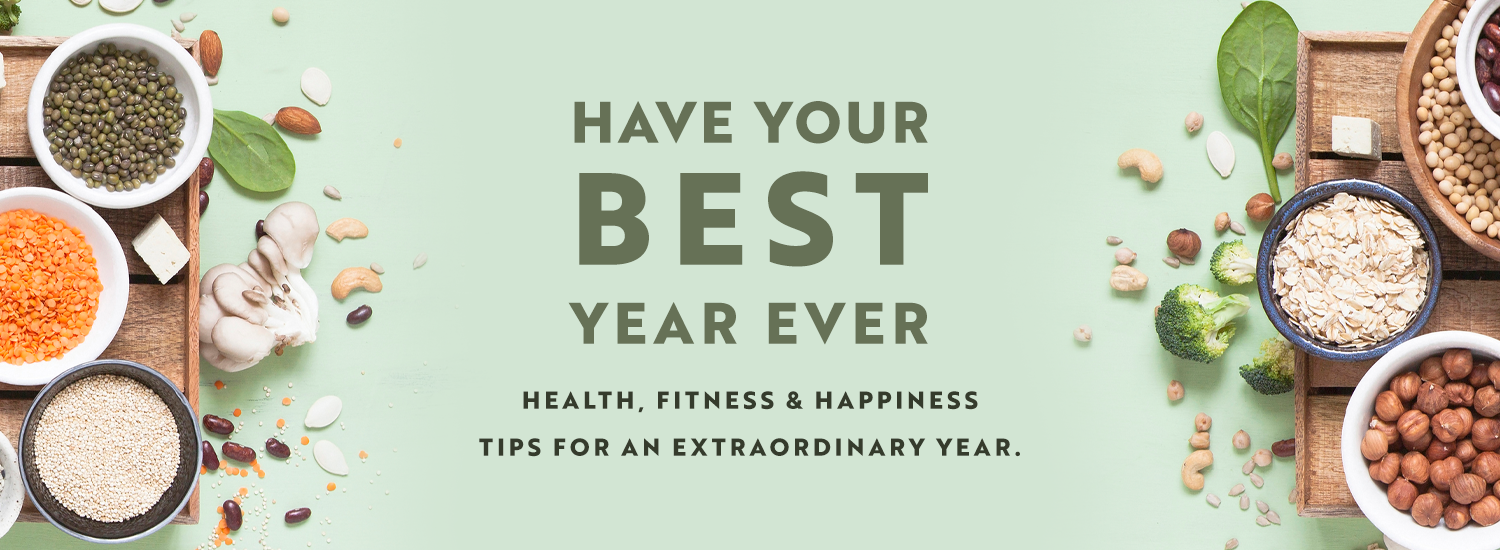Kickstarting a Healthier YOU!

Kickstarting a Healthier YOU!
It’s the new year and an ideal opportunity to set new resolutions.
You may want to improve your fitness, lose some weight or revitalise and recharge in 2021. Whatever it is, a great place to start when it comes to improving your health is your diet.
So, here at Nutravita, we’ve provided some tips on how to nail your nutrition and feel your best self this year.
- AVOID CRASH OR FAD DIETS
Research has shown that the average person abandons a ‘fad’ diet after just 6 days!1 This is because drastic, overnight changes in our diet can be hard to stick to.
Cutting out certain food groups can also prevent you from getting important nutrients and vitamins in your diet that your body needs to function. This can lead us to feeling unwell and tired, causing us to quickly return to old habits and often regain the weight that was lost. Don’t worry -we’ve all been there!
The key to achieving a healthy, balanced diet is to include a variety of food groups and to not restrict ourselves with ‘quick fix’ diets. Make realistic changes that meet your nutritional needs and implement habits step by step that will last a lifetime.
- GET ENOUGH PROTEIN
We need protein in our diet because it helps us to repair and build muscle, keeping us in good health and able to perform daily activity.
The Reference Nutrient Intake (RNI) is set at 0.75g of protein per kilogram bodyweight per day for adults. That’s approximately 45g/day for a 60kg adult.2
However, how much protein we need can change according to how much exercise we are doing or our age. For example, strength training athletes may require more than the average population.
You can find protein in foods such as meat, poultry, fish and dairy, as well as plant-based protein sources such as beans, peas, lentils, grains, nuts, tofu and soya.
Our nutritionist says “Animal sources contain the full range of essential amino acids, whilst vegans and vegetarians should combine a variety of plant based protein sources to get all the essential amino acids they need.”
Here are some common sources of protein and how much protein they contain per average portion (estimated protein content g):
|
Average portion of food |
Protein content (g) |
|
150g chicken breast |
45.9 |
|
130g haddock fillet |
34.6 |
|
100g greek yogurt |
4.1 |
|
100ml cows milk |
3.6 |
|
100ml soy milk |
3 |
|
100g tofu |
12.6 |
|
½ tin chickpeas |
9.2 |
|
80g edamame |
9.4 |
- CHOOSE THE RIGHT FATS
A small amount of fat is a key to a healthy, balanced diet and provides us with important fat soluble vitamins such as vitamin A, D and E. However, too much fat in your diet, in particular saturated fat, can increase cholesterol levels which increases the risk of heart disease.
Therefore, it’s important to moderate the amount of fat we have in our diet and to replace saturated fats with unsaturated fats where possible.
For example, limit foods high in saturated fat including fatty cuts of meat, butter, ghee, lard, coconut oil, cheese cream, fried foods and biscuits, cakes and pastries.
Aim to swap these for sources of unsaturated fats such as olive oil, vegetable oil, sunflower oil avocados, nuts and oily fish e.g. salmon, mackerel, sardines, trout.
Our nutritionist says “Some foods, for example dairy products, may be labelled as ‘low’ or ‘reduced’ fat. These can be helpful if you are looking to reduce your fat and/or calorie intake. However, watch out as just because something contains less fat than a similar product, doesn’t mean it isn’t still a high fat food. Also, the fat is sometimes replaced with sugar which means the calorie content can end up the same.”
- SNACK ATTACK
With many of us working from home at the moment, those afternoon trips to the kitchen have become much more familiar!
It’s recommended that we have 3 main meals and 2 healthy snacks a day. So, choose snacks that contain a good source of protein and an extra boost of carbohydrates and healthy fats as this will help to keep you satisfied between meals.
Some healthy snack ideas include:
- Half an avocado with a pinch of salt or dried chilli on a slice of rye bread
- Roasted chickpeas sprinkled with chia seeds
- Frozen yogurt bark with fruit and nuts
- Celery or apple dipped in peanut butter
- Smoked mackerel spread on wholegrain crackers
- AVOID NUTRIENT SHORTFALLS
The start of the year is a great time to review your current nutritional intake and check for any nutrient shortfalls. If you find it challenging to get certain nutrients through food alone, you may wish to consider taking a supplement. However, always check with your healthcare professional first if you have any concerns.
Our nutritionist says “We are all recommended to take a daily 10 microgram vitamin D supplement in the winter months (October-April) due to reduced sunlight which makes it harder to produce enough vitamin D in the skin. Also, if you are vegan, there are some nutrients in which you may be particularly at risk of being deficient in, such as vitamin B12.”
We hope this helps you kick-start a healthier 2021. From the team here at Nutravita, we wish you a very happy and healthy New Year!
References:
- https://www.independent.co.uk/life-my/diet-weight-loss-food-unhealthy-eating-habits-a9274676.html
- https://www.nutrition.org.uk/nutritionscience/nutrients-food-and-ingredients/protein.html

